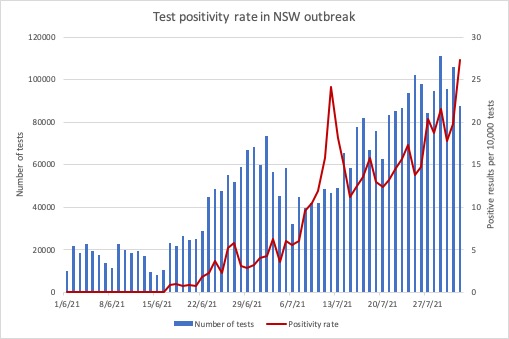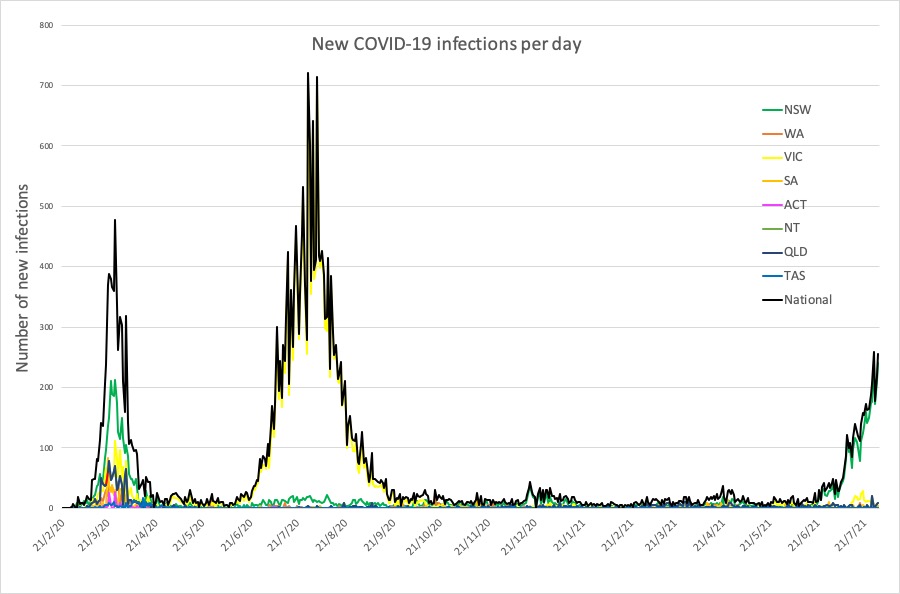And Sydney's restrictions have avoided thousands of cases but haven't gone far enough.
Welcome to The Medical Republic’s COVID Catch-Up.
It’s the day’s covid-19 news in one convenient post. Email bianca@biancanogrady.com with any tips, comments or feedback.
2 August
- ATAGI recommends Pfizer vaccine for at-risk 12-15-year-olds.
- Sydney restrictions have avoided thousands of cases, but don’t go far enough, study suggests.
- Delta variant as transmissible as chicken pox, even from those who are vaccinated, CDC says.
- What is the ratio of positive cases to tests in Sydney?
- South-east Queensland extends lockdown as more school students diagnosed.
- Latest covid infection numbers from around Australia.
Children aged 12-15 with underlying health conditions, living in remote communities, or who are Aboriginal or Torres Strait Islander can now get vaccinated with the Pfizer vaccine.
The Australian Technical Advisory Group on Immunisation now recommends that these children are prioritised for vaccination with Pfizer, as larger numbers of young adults and children are being infected with covid and hospitalised.
Speaking at a press conference today, Deputy Chief Medical Officer Professor Michael Kidd said he was very concerned about the severity of the Delta outbreak and the increasing numbers of young people ending up in intensive care units.
Children aged over 12 will be vaccinated in two stages. The first will prioritise those at highest risk, such as children with medical conditions such as asthma, diabetes, obesity, cardiac congenital abnormalities and compromised immunity, as well as children in remote communities and Aboriginal and Torres Strait Islander children.
A decision about vaccinating other 12-15-year-olds will be made in coming months, ATAGI said in a statement.
Sydney would be experiencing around 1000 new cases of covid a day if stay-at-home restrictions had not been introduced in late June, but case numbers are predicted to rise above 500 per day by the end of this week, researchers say.
Writing in MJA Insight, researchers from the Burnet Institute in Melbourne used models developed from Melbourne’s major outbreak in winter 2020 to explore how Sydney’s current outbreak might progress.
They found that infection rates have doubled every nine days on average, since the outbreak began in mid-June. However the increased transmissibility of the Delta variant and increasing number of people being in the community while infectious have made it harder for contact tracers to stay in front of the outbreak.
These factors are working against the tougher restrictions on movement, which will also take some time to have an effect. The group’s modelling predicted case numbers will hit around 570 per day by this Friday. Despite falling case numbers in south-west Sydney, cases are increasing elsewhere.
“Furthermore, unless new controls introduced on 28 and 30 July or in the future (eg. LGAs that develop large case numbers are included in the tighter controls) have a major impact, our model projects that Sydney will have about 7700 cases per day 4 weeks from now,” the authors wrote.
They recommended that the more stringent restrictions currently in place across eight local government areas should be extended across of all of Sydney. But even with that in place, they predicted that case numbers are unlikely to drop below five cases per day until the end of September.
The Delta variant is on par with chicken pox in terms of transmissibility, may cause more severe disease, and breakthrough infections in the fully vaccinated may be as transmissible as infections in the unvaccinated.
Those are some of the worrying conclusions of a leaked report from the US Centers for Disease Control, which was published by the Washington Post last week.
The report also concludes that non-pharmaceutical interventions – mask-wearing in particular – will be essential to reduce transmission of Delta, even in highly vaccinated populations.
In general, vaccination is associated with an eight-fold reduction in disease incidence, and 25-fold reductions in hospitalisation and death, according to data from the US.
However the Delta variant is shaping up as a game-changer, with data suggesting significantly higher viral loads in those infected, longer infectious periods, and higher risk of reinfection.
Research is also suggesting higher odds of hospitalisation, intensive care admission and death associated with Delta infections, and lower protection from the Pfizer vaccine than is achieved against the Alpha variant.
“Given higher transmissibility and current vaccine coverage, universal masking is essential to reduce transmission of the Delta variant,” the report’s author concluded.
Their argument was supported by a study of 469 covid cases reported in a town in Massachusetts, which was the site of several large public gatherings in July this year.
Three-quarters of cases were in fully-vaccinated individuals, and testing of 133 specimens revealed 90% were caused by the Delta variant, according to a report in Morbidity and Mortality Weekly Report.
Five people were hospitalised – four of whom were vaccinated – but at the time of publication no deaths had been reported. The authors said their findings suggested even locations without high infection rates should consider mask mandates for indoor settings, regardless of vaccination status.
As NSW breaks state records for the number of covid tests being conducted each day, a key question is how many of those tests are delivering a positive result.
The ‘percent positive’ rate gives an indication of how much covid is circulating, and whether enough testing is being done given infection rates.
The good news for the NSW outbreak is that the percent positive rate for this outbreak so far has remained well below 1%. According to experts, 5% positive is considered the threshold for too high.
Here’s a chart showing how many tests have been done each day in NSW since the beginning of June, and how many positive results have been found per 10,000 tests. (Data from NSW Health).

South-east Queensland is in the grip of stay-at-home restrictions until at least Sunday 8 August, as it records 13 new locally-acquired cases of covid, 10 of whom are aged under 10 years.
The origins of the outbreak, which started with a student at a highschool, are still unknown, but the genome sequence of the virus matches that from two returned travellers in quarantine.
Here are the latest covid-19 infection numbers from around Australia to 9pm Sunday:
National – 34,384 with 924 deaths
ACT – 124 (0)
NSW – 9153 (240)
NT – 197 (0)
QLD – 1809 (9)
SA – 862 (3)
TAS – 234 (0)
VIC – 20,948 (4)
WA – 1057 (0)



